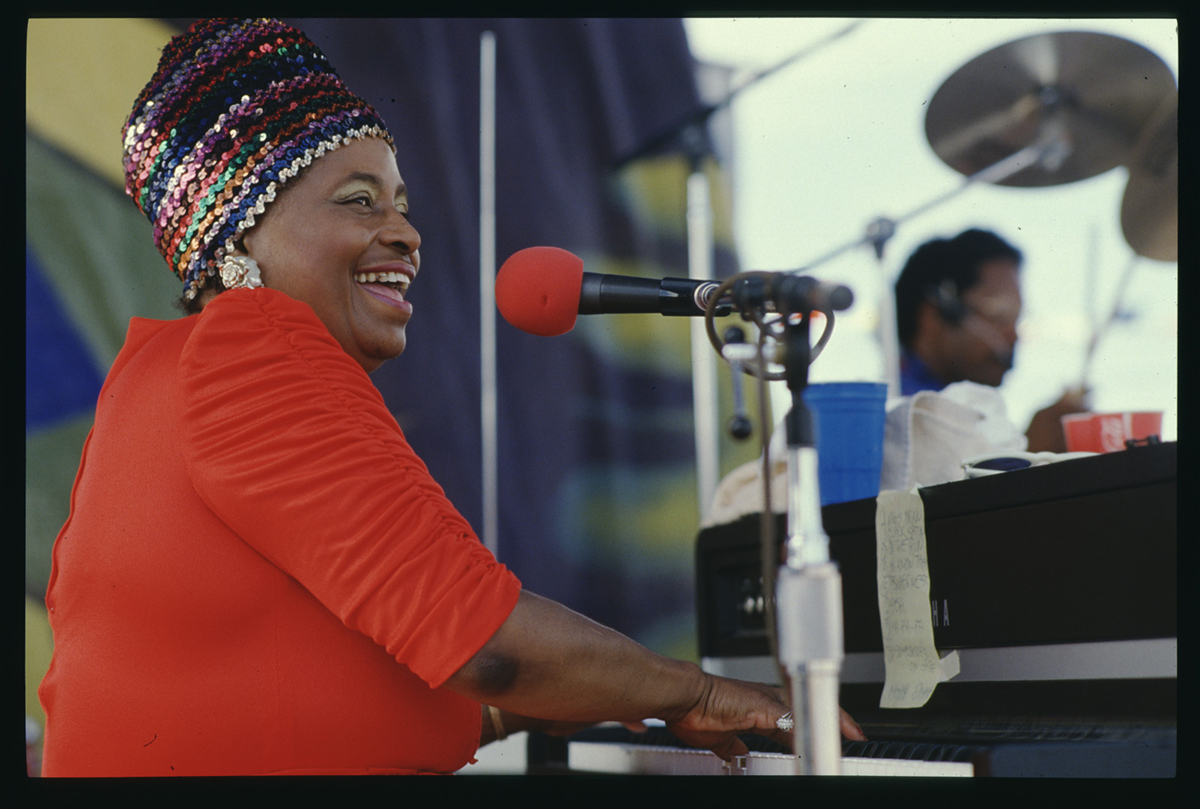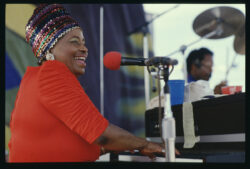Katie Webster
Boogie-woogie pianist and blues vocalist Katie Webster was a prolific recording and touring musician.

The Historic New Orleans Collection
Katie Webster Performing at Jazz Fest. Photo by Michael P. Smith
Boogie-woogie pianist and blues vocalist Katie Webster first gained recognition as a session musician for southwest Louisiana musicians in the 1950s and ’60s, recording for the Goldband and Excello labels. On stage from 1964 to 1966, she performed as opening act for Otis Redding and as a member of the soul star’s band. In the 1980s Webster experienced a resurgence as a featured act at festivals. She represents that part of Louisiana’s rhythm-and-blues legacy that overlaps the southeast Texas border, a corridor of influence that inspired swamp pop, swamp blues, and zydeco, extending from Houston to Lake Charles, Crowley, Lafayette, Baton Rouge, and New Orleans. The Boston Globe praised Webster as a powerfully expressive performer who can say “more about the pain of betrayal with one low, sad growl, and more about the joy of fighting back against cruel life with one teasing roll of her eyes than most could write in a book.”
Religion vs. Rock and Roll
Born Kathryn Jewel Thorne in Houston, Texas, on January 11, 1936, Webster taught herself piano as a child, becoming proficient at a young age. Because her religious parents distained blues music, rhythm and blues, and rock and roll, she secretly listened to secular music at night via a radio hidden beneath her bed covers.
Recalling an incident from childhood, she told music journalist Bill Dahl: “One afternoon my friends were outside the front of the house, and I’m just tearing up Fats Domino, when my mother got off the bus. When my little sister told me, ‘Mother’s comin’ around the corner,’ I started playing ‘Jesus, Keep Me Near the Cross.’ My mother wasn’t fooled. She said, ‘I was down the street and what I heard before I turned that corner didn’t sound anything like ‘Jesus, Keep Me Near the Cross.’ ”
The Swamp Boogie Queen
Webster was in her teens when her parents moved to California, leaving her to live with less restrictive relatives in Beaumont, Texas. Allowed to perform secular music, she soon became an in-demand studio pianist. By age fifteen, she played recording sessions for Louisiana producers Eddie Shuler in Lake Charles and J. D. Miller in Crowley. Recording in the 1950s and ’60s for Shuler’s Goldband label and the Miller-affiliated Excello in Nashville, Webster contributed to hundreds of recordings by swamp blues artists Slim Harpo, Lazy Lester, and Lightnin’ Slim, zydeco pioneer Clifton Chenier, and others. In 1959 she played for Lake Charles–singer Phil Phillips’ “Sea of Love,” which rose to number two on the Billboard Hot 100 pop singles chart, selling more than a million copies. In addition to studio work for various artists, Webster recorded under her own name. She also performed with her own band, the Uptighters, in the Lake Charles area.
In 1964 Webster impressed Otis Redding when she opened for him at the Bamboo Club in Lake Charles. “When Otis heard my big mouth hollering and screaming,” she recalled, “he came out of the dressing room in his red silk underwear, running through the crowd, shouting, ‘Stop that woman! Don’t let her get off the stage! I gotta talk to her tonight!’ ” Performing with Redding for three years, Webster can be heard on his Live at the Whiskey a-Go-Go album. In 1967 the pregnant Webster, who was married to pianist Earl Webster, was at home when Redding was killed in a plane crash. Devasted by the loss, she largely dropped out of music before spending much of the 1970s caring for her parents in Oakland, California.
A European tour in 1982 brought Webster out of retirement. She ultimately toured Europe more than thirty times, and became a festival performer in the United States, appearing at the New Orleans Jazz & Heritage Festival, Newport Folk Festival, and the Chicago, Boulder, and San Francisco blues festivals. In 1988, when her popularity was at an all-time high, she recorded Swamp Boogie Queen, the album considered her quintessential studio work. Released by Alligator Records, Swamp Boogie Queen features guest appearances by Bonnie Raitt, Kim Wilson, and Robert Cray. In 1992 Webster joined the Alligator Records twentieth-anniversary tour, which is documented by the film and soundtrack album Pride and Joy: The Story of Alligator Records. On tour in Greece in 1993, she suffered a stroke that damaged her left hand and ruined most of her eyesight. She returned to performing, singing, and playing with her right hand at select festivals until a fatal heart attack on September 9, 1999. Webster was sixty-three when she died.
